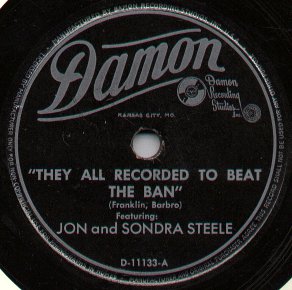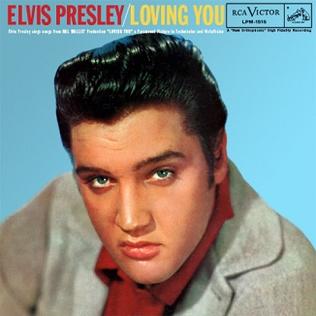Related Research Articles
Rock and roll is a genre of popular music that evolved in the United States during the late 1940s and early 1950s. It originated from African American music such as jazz, rhythm and blues, boogie-woogie, electric blues, gospel, jump blues, as well as country music. While rock and roll's formative elements can be heard in blues records from the 1920s and in country records of the 1930s, the genre did not acquire its name until 1954.

Antoine Dominique Domino Jr., known as Fats Domino, was an American singer-songwriter and pianist. One of the pioneers of rock and roll music, Domino sold more than 65 million records. Born in New Orleans to a French Creole family, Domino signed to Imperial Records in 1949. His first single "The Fat Man" is cited by some historians as the first rock and roll single and the first to sell more than 1 million copies. Domino continued to work with the song's co-writer Dave Bartholomew, contributing his distinctive rolling piano style to Lloyd Price's "Lawdy Miss Clawdy" (1952) and scoring a string of mainstream hits beginning with "Ain't That a Shame" (1955). Between 1955 and 1960, he had eleven Top 10 US pop hits. By 1955, five of his records had sold more than a million copies, being certified gold.

Patrick Charles Eugene Boone is an American singer, actor and composer.

Damon Records was a United States record label.

David Louis Bartholomew was an American musician, bandleader, composer, arranger, and record producer. He was prominent in the music of New Orleans throughout the second half of the 20th century. Originally a trumpeter, he was active in many musical genres, including rhythm and blues, big band, swing music, rock and roll, New Orleans jazz, and Dixieland. In his induction into the Rock and Roll Hall of Fame, he was cited as a key figure in the transition from jump blues and swing to R&B and as "one of the Crescent City's greatest musicians and a true pioneer in the rock and roll revolution".
The origins of rock and roll are complex. Rock and roll emerged as a defined musical style in the United States in the early to mid-1950s originating from African-American music. It derived most directly from the rhythm and blues music of the 1940s, which itself developed from earlier blues, the beat-heavy jump blues, boogie woogie, up-tempo jazz, and swing music. It was also influenced by gospel, country and western, and traditional folk music. Rock and roll in turn provided the main basis for the music that, since the mid-1960s, has been generally known simply as rock music.

"Blueberry Hill" is a popular American song published in 1940 and first recorded and released by Sammy Kaye in 1940 on RCA Victor. It is best remembered for its 1950s rock and roll version by Fats Domino.
"You Always Hurt the One You Love" is a pop standard with lyrics by Allan Roberts and music by Doris Fisher. First recorded by the Mills Brothers, whose recording reached the top of the Billboard charts in 1944, it was also a hit for Sammy Kaye in 1945.
"Again" is a popular song with music by Lionel Newman and words by Dorcas Cochran. It first appeared in the film Road House (1948), sung by Ida Lupino. An instrumental rendition was used in the movie Pickup on South Street (1953). By 1949, versions by Vic Damone, Doris Day, Tommy Dorsey, Gordon Jenkins, Vera Lynn, Art Mooney, and Mel Tormé all made the Billboard charts.

"Ain't That a Shame" is a song written by Fats Domino and Dave Bartholomew. Domino's recording of the song, originally stated as "Ain't It a Shame", released by Imperial Records in 1955, was a hit, eventually selling a million copies. It reached number 1 on the Billboard R&B chart and number 10 on the pop chart. The song is ranked number 438 on Rolling Stone magazine's 500 Greatest Songs of All Time list.
"You Can't Be True, Dear" is a popular German song.

Overton Amos Lemons, known as Smiley Lewis, was an American New Orleans rhythm and blues singer and guitarist. The music journalist Tony Russell wrote that "Lewis was the unluckiest man in New Orleans. He hit on a formula for slow-rocking, small-band numbers like 'The Bells Are Ringing' and 'I Hear You Knocking' only to have Fats Domino come up behind him with similar music with a more ingratiating delivery. Lewis was practically drowned in Domino's backwash."
"Have I Told You Lately That I Love You?" is a popular song written by Scotty Wiseman for the 1944 musical film, Sing, Neighbor, Sing and performed by Lulu Belle and Scotty. It was their greatest hit and one of the first country music songs to attract major attention in the pop music field. Although the song was featured in the movie, it was not released by Lulu Belle and Scotty until 1947. The first released version of this song was by Gene Autry in 1945.

"Melody of Love" is a popular song. The music was originally written by Hans Engelmann in 1903. The lyrics were added by Tom Glazer in 1954.

"Good Rocking Tonight" is a jump blues song originally released in 1947 by its writer, Roy Brown and was covered by many recording artists. The song includes the memorable refrain, "Well I heard the news, there's good rocking tonight!" The song anticipated elements of rock and roll music.
"One Night" is a song written by Dave Bartholomew, Pearl King, and Anita Steiman. It originally was an R&B hit for Smiley Lewis in 1956, before being recorded with greater commercial success by Elvis Presley in 1958.
Borney Bergantine was the composer of "My Happiness," a music hit from the late 1940s that endures as an American love tune.

Loving You is the first soundtrack album by American rock and roll singer Elvis Presley. It was released by RCA Victor in mono, LPM 1515, in June 1957 to accompany his film, Loving You (1957). Recording sessions took place on January 15, 16, 17, and 18, 1957, at the Paramount Pictures Scoring Stage, and on January 12, 13, 19, and February 23 and 24, 1957, at Radio Recorders in Hollywood. These are the first sessions where Steve Sholes is officially listed as producer. It spent ten weeks at No. 1 on the Billboard Top Pop Albums chart. It was certified Gold on April 9, 1968 by the Recording Industry Association of America.
"Don't Forbid Me" is a popular song by Charles Singleton. Among Singleton's huge number of compositions was "Tryin' to Get to You", which had previously been recorded by Elvis Presley at Sun Records. In 1957, "Don't Forbid Me" was a number 1 hit for Pat Boone, and also peaked at number 10 on the Most Played R&B in Juke Boxes chart.
References
- 1 2 Murrells, Joseph (1978). The Book of Golden Discs (2nd ed.). London: Barrie and Jenkins Ltd. p. 45. ISBN 0-214-20512-6.
- 1 2 Gilliland, John. (197X). "Pop Chronicles 1940s Program #21 – All Tracks UNT Digital Library". Digital.library.unt.edu. Retrieved 2021-02-11.
- ↑ "MERCURY 78rpm numerical listing discography: 5000 - 5500". 78discography.com.
- ↑ Earl W. Clark, Allen J. SingerBeverly Hills Country Club 1439622345 – 2010 -"Jon and Sondra Steele were a married act who sang soft, sentimental ballads in sweet harmony. Their biggest, and perhaps only hit, was their cover of “My Happiness” in 1948. This tune had been recorded by a number of artists, but the ...
- ↑ Schmitt, Al; Droney, Maureen (2018). Al Schmitt – On The Record: The Magic Behind the Music. Lanham, Maryland, USA: Rowman & Littlefield. p. 36. ISBN 9781538137666.
- ↑ Whitburn, Joel (2004). The Billboard Book of Top 40 Hits (8th ed.). Billboard Books. p. 240. ISBN 0-8230-7499-4.
- ↑ "Elvis Presley's first recording sells for $300,000". BBC News. 9 January 2015. Retrieved 10 January 2015.
- ↑ "Vera Lynn with Roland Shaw Orchestra : If I Am Dreaming". Discogs.com. Retrieved January 28, 2018.
- ↑ Windsor Star 26 May 1956 "Gale Storm Gains New Fame as Singing Star" by Matt Dennis p. 9
- ↑ "Fats Domino : This Is Fats". Discogs.com. Retrieved January 9, 2020.
- ↑ "Pat and Shirley Boone : Side by Side". Discogs.com. Retrieved January 28, 2018.
- ↑ "Teresa Brewer : Songs Everybody Knows". Discogs.com. 1961. Retrieved January 28, 2018.
- ↑ "The Andrews Sisters : Great Country Hits". Discogs.com. 1964. Retrieved January 28, 2018.
- ↑ "Slim Whitman : Happy Street". Discogs.com. 1969. Retrieved January 28, 2018.
- ↑ "Dabiel O'Donnell & Mary Duff : Together Again". Discogs.com. Retrieved January 28, 2018.